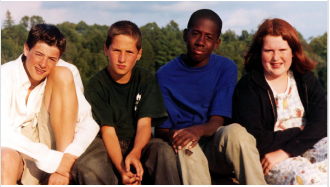
A Mind of Your Own 1999
Distributed by Fanlight Productions, 32 Court St., 21st Floor, Brooklyn, NY 11201; 800-876-1710
Produced by National Film Board of Canada
Directed by Gail Sweeney
VHS, color, 37 min.
High School - Adult
Education, Psychology, Learning Disabilities
Date Entered: 11/09/2018
Reviewed by Helen McCullough, Media Services, Pelletier Library, Allegheny CollegeHenry, Matt, Max, and Stephanie are in their early teens. They are talented, articulate, and have a wide range of interests. They also have another thing in common; they all have learning disabilities. In this program, the four youngsters share their thoughts about being "different" and their strategies for coping with the problems that arise from their disabilities.
The program allows each child to tell his/her own story without the mediation of narrators or learning disabilities authorities. Dispensing with this sort of defining structural organization gives power and immediacy to the individual stories. Each youngster is more than capable of speaking authoritatively about what it means to grow up with learning disabilities and what it takes to succeed in spite of them.
Henry, who started playing chess at age six and excels in math, had trouble with reading skills. With the help of his grandmother, and his own determination, Henry is making huge strides in spelling and reading. Stephanie found out she had a learning disability when she was eight years old and was put in a special LD class. Although she's now in a regular class, she still feels that she has to work through the stigma of being labeled "dumb." She, herself, realizes that there is no truth to the stigma and speaks eloquently about the many talents and strengths of her friends in the LD class. Matt's goal was to graduate eighth grade and move on to high school with his friends. He wasn't doing well in school because his reading skills weren't very good and he got nervous taking tests. But he decided to believe in himself and to work hard to achieve his goal. Max, who is outgoing and articulate, believes that making and keeping friends is very important and he credits Ritalin for his success in this area of his life. While he was completing his autobiography for a school project, Max realized that he had grown and acquired many new skills since his LD diagnosis in grade school.
The stories of Henry, Matt, Max, and Stephanie can teach a valuable lesson to LD children and their parents. These bright young people prove that an LD diagnosis doesn't doom a child to failure. The program succeeds in showing that children with learning disabilities may not have the culturally defined skills required by public education, but they have other abilities and talents that are just as critical to growth and happiness.
Sometimes, due to a heavy editorial hand, National Film Board of Canada productions can be awfully earnest. This production avoids that difficulty and provides a warm, inspirational message. As with all NFB productions, this production has no technical faults. The editing, pacing, and sound are excellent.
The program is highly recommended to school and public libraries.